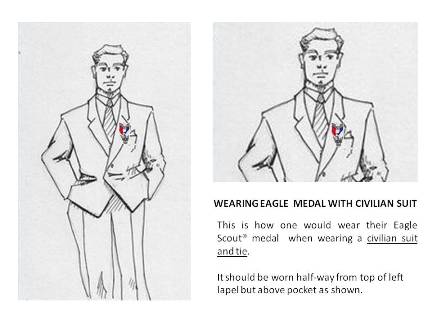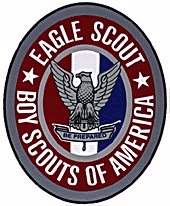Insignia
Adult
Insignia
Left Front
Wearing Eagle Medal
Wearing the Eagle Medal
maximo@kdsi.net writes:
I would like to know the rules concerning the Eagle medal. Are Scouters
allowed to wear the medal? If so, when? Do scouts only wear the medal
during 'formal' occasions? Between the badge and square knot, I have never
found the medal explained.
(The words "Eagle Scout®" are a registered trademark of the Boy Scouts of America. I have chosen not to include the small "r" every time it is mentioned. Likewise, the design of the Eagle Scout Award medal and cloth badges are registered trademarks of the BSA.)
More detail is explained within the second EagleTip™, . In the meantime, the basic rules are as follows:
The Eagle Scout Award has THREE BASIC COMPONENTS:
 The Medal: The silver medal with the red, white and blue ribbon is designed
for FORMAL OCCASIONS by both youth and adult Eagle Scouts. Formal occassions
include any event in which Eagle Scouts will be recognized or in which youth
members will be present. This includes Courts of Honor, Blue and Gold
Banquets, and other similar-type unit, District, Council, Regional, and
National recognition banquets and dinners. Community activities and similar type dinners are also suitable occasions for its wear. It is NOT worn during camping events, even during outdoor award ceremonies unless it is an Eagle Scout Court of Honor. The Medal: The silver medal with the red, white and blue ribbon is designed
for FORMAL OCCASIONS by both youth and adult Eagle Scouts. Formal occassions
include any event in which Eagle Scouts will be recognized or in which youth
members will be present. This includes Courts of Honor, Blue and Gold
Banquets, and other similar-type unit, District, Council, Regional, and
National recognition banquets and dinners. Community activities and similar type dinners are also suitable occasions for its wear. It is NOT worn during camping events, even during outdoor award ceremonies unless it is an Eagle Scout Court of Honor.
The Eagle Scout Medal is worn by YOUTH members immediately above the top of
the left pocket flap of the uniform, either by itself or with other medals.
If worn with other medals, the order in which the Eagle Scout Medal is worn
with those other medals are up to the individual Eagle Scout. There is NO
OFFICIAL "wearing order of merit" for the Eagle medal.
The Eagle Scout Medal is worn by ADULT members also immediately above the top of the left pocket flap of the uniform, either by itself or with other
medals. Again, if worn with other medals, the order in which that the Medal
is worn with those other medals is up to the individual Eagle Scout.
The Eagle Scout Medal may be worn by former Scouts/Scouters with a formal outfit (suit, dinner jacket, or tux) by wearing the medal on the LEFT LAPEL approxiamtely HALFWAY between the top and bottom of the lapel. The small Eagle Scout lapel pin or the larger Eagle Scout "parent pin" may be worn in its place at the discretion of the Eagle Scout.

How to wear the Eagle Scout Medal with a civilian suit and tie...
UNOFFICIALLY, some Eagle Scouts have found a red, white, and blue
contest necklace-type ribbon and have attached the bottom portion (the silver
Eagle part) of their Eagle medal to the necklace-type ribbon and wear it with
their suit and tie. If worn in this manner, it is worn suspended so that the
Eagle lies on the tie of the Eagle Scout.
In all cases, the Eagle Scout Palm(s), if earned, are placed on the ribbon of
the Medal. Only the highest combination of Palms earned (in other words not all three Palms unless all three are Silver) are worn. For instance, if an Eagle Scout earned the Bronze, Gold and Silver Palm, *only the Silver Palm* is worn. If an Eagle Scout earned all three Palms twice, then only TWO Silver Palms are worn (the highest combination representing the highest number of palms earned).
 The CLOTH BADGE: The Eagle Scout cloth badge comes in different designs depending on how long ago or how recent the Eagle has earned their Eagle
Scout Badge. All of the cloth badges have in common a red, white and blue
background on which a silver or gray Eagle is placed in the center. The CLOTH BADGE: The Eagle Scout cloth badge comes in different designs depending on how long ago or how recent the Eagle has earned their Eagle
Scout Badge. All of the cloth badges have in common a red, white and blue
background on which a silver or gray Eagle is placed in the center.
ONLY YOUTH MEMBERS WEAR THE CLOTH BADGE.
YOUTH MEMBERS wear the Eagle Badge centered on the left pocket of the uniform shirt. Eagle Scout Palms are placed centered on or near the Eagle Scout Badge. Some of the newer versions will present a challenge to youth Eagle Scouts to place Palms to the Eagle attached to the cloth badge. Flattening with an iron and then attaching the Palms; or attaching the Palms to the uniform shirt immediately beside the cloth badge are acceptable alternatives.
 and the SQUARE KNOT: The red, white and blue striped square knot is ONLY worn by Eagle Scouts, and ONLY by adult Eagle Scouts. ADULT MEMBERS wear the Eagle Scout square knot above the left pocket seam of the field uniform.
ONLY ADULTS (defined by the BSA as adults above the age of 18 years of age in
Boy Scouting and Cub Scouting; 21 years of age in all other programs) wear
the square knot. The background of the knot has NO BEARING on the Award and
the Eagle knot on tan background is acceptable for wear on the kelly green
Venturing uniform. The knot is worn as shown here, with the two blue ends of the rope
to the wearer's right (it is left as you look at it on a uniform, as shown here). and the SQUARE KNOT: The red, white and blue striped square knot is ONLY worn by Eagle Scouts, and ONLY by adult Eagle Scouts. ADULT MEMBERS wear the Eagle Scout square knot above the left pocket seam of the field uniform.
ONLY ADULTS (defined by the BSA as adults above the age of 18 years of age in
Boy Scouting and Cub Scouting; 21 years of age in all other programs) wear
the square knot. The background of the knot has NO BEARING on the Award and
the Eagle knot on tan background is acceptable for wear on the kelly green
Venturing uniform. The knot is worn as shown here, with the two blue ends of the rope
to the wearer's right (it is left as you look at it on a uniform, as shown here).
Life Members of the National Eagle Scout Association (NESA) may choose to wear a special version of the Eagle square knot insignia. This special square knot has a silver Mylar border and is worn in lieu of (in the place of) the regular square knot version (see above left). More information can be found at this page.
Holders of the Distinguished Eagle Scout Award (DESA) wear the gold Eagle device centered on the Eagle Scout square knot or the NESA Life Member square knot emblem.
Holders of the Outstanding Eagle Scout Award (OESA) wear the silver Outstanding Eagle Scout device centered on the Eagle square knot or the NESA Life Member square knot emblem.
Eagle Scout Palms are worn centered on either Eagle Scout square knot as shown
on another part of the Badge and Uniform site.
Hope that this all helps out...
Thanks for asking!
Settummanque!
Back to the Top of this Page
Credits: Scans courtesy of Mike Walton.
This webpage is designed for printing, three-hole punching, and insertion into
Your Binder!
 Back to The Tree Back to The Tree
 Insignia mainpage Insignia mainpage
© 2009-2014 Settummanque!
Designed by
Mike Walton

Created with the CoffeeCup HTML Editor
*Boy Scouts of America®, BSA®, the Universal Emblem, Arrow of Light®, Cub Scouts®, Eagle Scout®, Scouting®, Order of the Arrow®
and all other related marks and insignia, are either registered trademarks or trademarks of Boy Scouts of America in the United States and/or
other countries. All other trademarks are the property of their respective owners.*
|